九年级英语上Unit 1测试
人教版九年级英语上册Unit 1测试题及答案

人教版九年级英语上册Unit 1测试题及答案二、单项选择(每小题1分,共15分)从每小题所给的四个选项中选出最佳选项。
( D)31.If you want to send your photos by email,connect the camera ______ your computer.A.for B.of C.in D.with( A)32.Mr.Smith knows a lot about China ______he has never been to our country.A.although B.untilC.if D.since( D)33.The ______ you work at your lessons,the ______ results you will get.A.hard;good B.harder;goodC.hard;better D.harder;better( A)34.Our teacher is ______ to explain the rules to us.A.patient B.nervousC.active D.quick( C)35.Tom always pays ______ to his teacher in class,so he is making great progress.A.conversations B.moneyC.attention D.ideas( C)36.—Hi,Tom!Why are you so unhappy?—I missed the exciting match ______ the bad traffic.A.in order to B.becauseC.because of D.instead of( B)37.I can understand your meaning by watching the ______ on your face.A.signs B.expressionsC.experience D.messages( A)38.—Why not listen to BBC news to improve your listening skills?—It’s ______ difficult for me ______get it.A.too;to B.so;thatC.such;that D.so;too( A)39.—Can you give me some suggestions on reading books?—You’d better ______ in the dictionary when you meet the new words.A.look up B.look aroundC.look for D.look like( C)40.—What are we going to do after school?—What about ______basketball?A.play B.to playC.playing D.played( C)41.______conversations with friends in English ______ my speaking skills.A.To have;improve B.To have;improvedC.Having;improves D.Having;improve( A)42.Physics is much ______ for me after Mrs.Yang taught us.A.easier B.more easierC.more easy D.most easy( C)43.—I am afraid to ask questions because of my poor ______.—You’d better practice speaking more.A.introduction B.invitationC.pronunciation D.information( C)44.—My English is very poor.What shall I do?—______ join the English club?A.How about B.Why don’tC.Why not D.Let’s( C)45.—I wonder if I can learn English well.—______.All things are difficult before they are easy.A.I am afraid so B.You’re slowC.It takes time D.It’s a piece of cake三、完形填空(每小题1分,共10分)(易读度:★★☆☆☆)阅读下面短文,从各题所给的选项中选出最佳答案。
人教版九年级英语全册 Unit 1 单元测试卷(含答案)
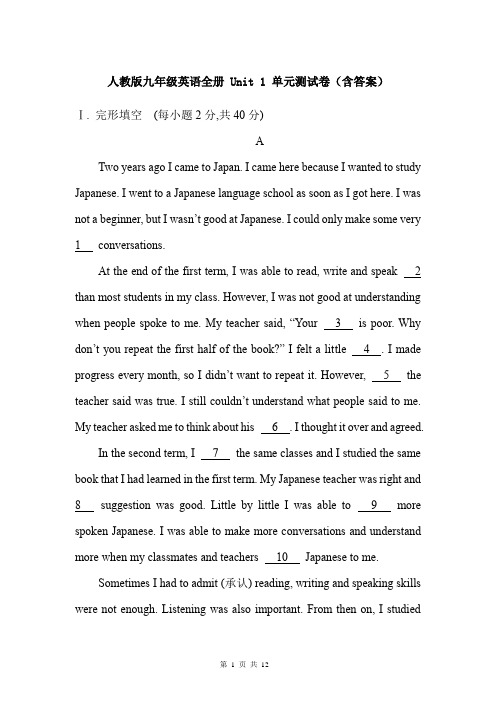
人教版九年级英语全册 Unit 1 单元测试卷(含答案)Ⅰ. 完形填空(每小题2分,共40分)ATwo years ago I came to Japan. I came here because I wanted to study Japanese. I went to a Japanese language school as soon as I got here. I was not a beginner, but I wasn’t good at Japanese. I could only make some very 1 conversations.At the end of the first term, I was able to read, write and speak 2 than most students in my class. However, I was not good at understanding when people spoke to me. My teacher said, “Your 3 is poor. Why don’t you repeat the first half of the book?” I felt a little 4 . I made progress every month, so I didn’t want to repeat it. However, 5 the teacher said was true. I still couldn’t understand what people said to me. My teacher asked me to think about his 6 . I thought it over and agreed.In the second term, I 7 the same classes and I studied the same book that I had learned in the first term. My Japanese teacher was right and 8 suggestion was good. Little by little I was able to 9 more spoken Japanese. I was able to make more conversations and understand more when my classmates and teachers 10 Japanese to me.Sometimes I had to admit (承认) reading, writing and speaking skills were not enough. Listening was also important. From then on, I studiedharder to improve my listening skill.1. A. difficult B. simple C. quick D. slow2. A. worse B. more C. better D. less3. A. reading B. writing C. listening D. speaking4. A. proud B. angry C. relaxed D. moved5. A. when B. how C. which D. what6. A. suggestion B. secret C. activity D. chance7. A. forgot B. repeated C. left D. increased8. A. his B. her C. their D. your9. A. notice B. understand C. add D. teach10. A. joined B. lent C. played D. spokeBAs a university student, I decided to learn German. I really liked the language, but I was not very good at learning it. The grammar 11me a lot and even drove me crazy. My only 12was listening—I always got an “A”. After two yea rs of study, I struggled (挣扎) to communicate in 13German and signed up (报名) to study in Germany to complete my degree. It was the hardest term I would ever have.The moment I 14Germany, I felt like I was starting from the beginning. The German I'd learned in university wasn't 15for everyday conversation. I was often nervous at school and I was 16my teachers. They always asked me some questions that I didn't understand.I only relaxed a little around my eightroommates, who were willing to speak German slowly to me and didn't seem to mind my 17.I chose to study three courses and the history class was the worst among them. The teacher spoke so 18that almost everything he said flew right over my head. I sat in the front, took notes and even recorded every single 19he said in class, but nothing helped.Years have passed, 20I still remember how it felt. That trip was a difficult but valuable lesson. I think my failure that term taught me just as much as my success.11.A.gave B.helped C.troubled D.saved12.A.action B.article C.agreement D.advantage13.A.perfect B.broken C.beautiful D.harmful14.A.arrived in B.handed in C.succeeded in D.took in15.A.peaceful B.painful eful D.careful16.A.pleased with B.angry with C.excited about D.afraid of17.A.purposes B.progress C.mistakes D.achievements18.A.slowly B.quickly C.clearly D.suddenly19.A.word B.book C.passage D.excuse20.A.and B.so C.but D.becauseⅡ.阅读理解(每小题2分,共20分)AChinese is getting more and more popular, so the UK government plans to invest (投资) 10 million pounds to help more kids learn Chinese. Do you think it is necessary for UK pupils to learn Chinese?Seneca (Canada)I studied French for 2 years in high school, and German for 4 years in college and got good marks. I studied Chinese for about 4 months before moving to China. For any language, if you don't use it, it will be easy to lose it. I've forgotten the French I learned except for a few phrases. I speak Chinese every day. My writing, reading and listening are quite good, but far from fluent. I think it's necessary to learn Chinese.Tony (the UK)Learning any language can be valuable, but it is not suitable for everyone. Chinese is a difficult language to learn, and teachers in the UK are not good at teaching foreign languages. However, China is a big and developing market for English business people. For them, Chinese is worth learning.Bill (the US)I don't think Chinese will replace (取代) English. Chinese is difficult to learn. To learn Chinese, you have to learn how to write and read it carefully. In the future Chinese will become more popular, so I think learning Chinese is a good thing.(E9301003)21.Seneca learnt German for .A.2 yearsB.4 monthsC.4 yearsD.6 years22.The underlined word “fluent” means “” in Chinese.A.糟糕的B.流利的C.完美的D.成熟的23.Tony thinks it's to learn Chinese.A.easyB.difficultelessD.interesting24.From the passage we know .A.Bill doesn't think Chinese will replace English in the futureB.Bill thinks it is easy to learn ChineseC.teachers in the UK are very good at teaching ChineseD.Seneca is very good at speaking Chinese25.What's the best title for the passage?A.How to learn Chinese wellB.Chinese is difficult to learnC.Do you like Chinese?D.Is it necessary to learn Chinese?BPerhaps you've seen the English letters “WC” in your city. They show public toilets. But do you know the expression is far from elegant (优雅的) English? In fact, foreigners from English⁃speaking countries rarely use the letters.Workers in our city are changing “WC” signs all over the city. The government is spending much money changing all the bad English on signs and restaurant menus. Many other places in China are following suit(照着做).“WC, or water closet, is old⁃fashioned English. It sounds dirty to me,” says Charlie Shifflet, a young man from the US. The old sign will become “Gents/Men” and “Ladies/Women”.“I see lots of poor English in everyday life, not only on signs,” he says. “I know what they mean. But they are Chinglish (中国式英语), not real English. For example, when someone says to me ‘My hometown is Henan Province.’ I know he should say, ‘My hometown is in Henan Province.’ ‘Hometown’ is a smaller place in a province.” The common mistakes he picked up include “Not Entry”, which should be “No Entry”. “Direction of Airport” should be changed into “To the Airport”. And it is “room rate”, not “room price”. And remember to “Keep off the grass”, rather than “Care of the green”. (E9301003)26.What does the writer think of the use of “WC”?A.He doesn't think it means “water closet”.B.He doesn't think it is old⁃fashioned English.C.He doesn't think it is proper for a sign.D.He thinks it is elegant English.27.The underlined word “rarely” means “”.A.sometimesB.seldomC.oftenD.always28.Charlie Shifflet .A.is a Chinese living in AmericaB.sometimes uses ChinglishC.likes to hear or see ChinglishD.thinks Chinese people sometimes use incorrect English29.The last paragraph is about .A.why there are so many Chinglish signsB.examples of ChinglishC.where Chinglish signs areD.who uses Chinglish signs30.We can read the passage from a magazine called “”.nguage LearningB.American HistoryC.Different CountriesD.Chinese CultureⅢ.语篇填空(每空2分,共20分)从方框中选择适当的词并用其正确形式填空,使短文通顺、意思完整。
初中英语九年级上册Unit 1 单元检测

九年级上册Unit 1 单元检测I. 单项选择(每小题1分,共15分)1.Most young people find _____ exciting to watch football games.A. oneB. thisC. thatD. it2. —When I speak English, I always make _____.—Don’t be afraid of that. That’s how we learn.A. troubleB. mistakesC. influenceD. challenges3. I don’t have a partner to practice English _____ on the weekend.A. toB. withC. andD. for4. I don’t like bread. I won’t eat it _____ I am very hungry.A. ifB. becauseC. asD. unless5. —Tommy, you can never let others know what I have told you today.—Don't worry. I will keep the _____.A. secretB. moneyC. addressD. grade6. During the Spring Festival, heavy snow stopped many people from _____ back home.A. goB. goesC. wentD. going7. You don’t have to_____ every new word in the dictionary while reading.A. look forB. look upC. look atD. look after8. —Jimmy, it’s time to go to bed.—Oh, I won’t do that _____ I finish my homework.A. ifB. beforeC. afterD. when9. The math teacher got angry with me because I did not _____ what he said in class yesterday.A. look forB. take careC. pay attention toD. fall asleep10. —Dad, must we wait until the light becomes green?—Yes, I’m afraid we _____. That’s the traffic rule.A. canB. mayC. have toD. need11. —The doctor told me not to eat too much, but I find it difficult.—The doctor is right. _____ you eat, _____ you will be.A. The less; the healthierB. The less; the more healthierB. The more; the healthier D. The more; the more healthier12. —Shall we go for a picnic tomorrow?—Well, it all _____ the weather.A. belongs toB. happens toC. depends onD. concentrates on13. —_____ did you tell him about the news, Lisa?—By _____an e-mail.A. How; sendingB. How; sendC. What; sendingD. What; send14. —What about keeping a diary in English? Do you learn English _____?—Yes. It helps to write English every day.A. the wayB. This wayC. by the wayD. in the way15. —Tomorrow will be fine. Shall we go out for a picnic?—_____.A. Sounds greatB. Good luckC. Have funD. Take it easyII.完型填空(每小题1分,共10分)I recently started learning German. I wanted to start writing __16___ in German as soon as possible, but I didn’t want to __17___ mistakes and teach myself bad habits. I wrote my first e-mail in German after reading just one short(40-page) book for learners__18___ in simple German, a few e-mail from a German friend, andafter __19___my very small word collection for a few months. And my e-mail in German had almost no mistakes.How was that __20___—writing correct sentences after getting so little input(投入)?My e-mail included very simple sentences.__21___ the most important thing was my research: I looked for example __22___ on the Web and in dictionaries.I __23___ a lot of time on each sentence. It took me more than an hour to write y first e-mail, which included only a few German sentences.The writing process(过程)was long and it __24___ much effort(努力),but it was fun. The experience was very encouraging and it made me even more __25___ in German. Perhaps one of the reasons why it was so enjoyable was that I knew I was building correct sentences.16. A. articles B. books C. e-mails D. stories17. A. make B. let C. get D. have18. A. read B. written C. had D. helped19. A. teaching B. improving C. adding D. using20. A. possible B. interesting C. important D. necessary21. A. And B. However C. But D. Unless22. A. pronunciation B. sentences C. passages D. words23. A. used B. wanted C. put D. spent24. A. needed B. asked C. took D. got25. A. interested B. enjoyable C. comfortable D. luckyⅢ.阅读理解(每小题2分,共30分)A26. ______ can take part in the English Summer Camp.A. Students under 13B. Students aged 16C. Students over 18D. All the students27. The English Summer Camp lasts ______.A. 9 daysB. 16daysC. 18daysD. 26days28. There are ______ ways for you to register for the English Summer Camp.A. oneB. twoC. threeD. four29. You can go register on ______.A. August 1stB. August 6thC. August 9thD. August 26th30. You can ______ by joining in the English Summer Camp.A. visit the whole countyB. become an experienced teacherC. improve your ChineseD. know about British customsBMy Plan for Learning EnglishMany students and teachers always ask this question “What’s the best way to learn English well?”Different people have different answers. Here is my plan for learning English. It is based on my own experience in learning languages. It helped me when I learn English. I hope that it can help you, too.●Speak to Americans al much so possible.●Write, write, write——letters, emails, notes, etc.●Make phone calls to practice your English.●Watch TV and movies.●Listen to the radio.●Read as much so possible.It is important to believe that you will improve your English. Sometimes when you make plans, they seem very difficult. Progress comes little by little. Think about where you are today, and you were last week or last month. Maybe it doesn’t seem you have come very far. But if you stop and think about where you were six months ago, or even a year ago, then you will see your progress. That progress gives you hope. Keep on studying, and you will reach your goal sooner or later!31. What do students and teachers often ask?A. How to speak English well.B. How to write English well.C. How to read English well.D. How to learn English well.32. The plan for learning English is based on ______.A. a student’s teaching storyB. a student’s learning storyC. an English teacher’s experienceD. the writer’s experience33. Which of the following is NOT true about the writer?A. He reads aloud in the morning.B. He watches English movies.C. He often writes English notes.D. He sometimes speaks English with friends on the phone.34. What is important for an English teacher?A. To study English every day.B. To speak with Americans.C. To listen to the radio.D. To believe that you will improve your English.35. The underlined word “progress” probably means “______” in Chinese.A. 经历B. 错误C. 进步D. 失败CThe purpose of students who come to school is to study. But studying needs right way, or would waste the time or the money. The followings are for studying.The best time for reading is morning. Because in the morning, the air is fresh and our minds are clear. For that reason, we can get good results.When we study we must be patient. If we don’t understand a text well, we must read it again. We should not read the next until we have learned the first one well.When we are studying, we must read it again. We should not read the test until we have learned the first one well.When we are studying, we must put our hearts into the book. We can not read absent-mindedly(心不在焉), or we could get nothing from the book while we are reading.We must always ask “why”. If we can’t understand well, write it down and ask our teachers or parents, brothers or friends, in some possible ways. We must know it completely and then our knowledge can be used well.Though there are many ways for studying, however, the above mentioned(提到的) will be helpful if we can keep them in heart.36. Morning is the best time for reading because ______.A. we can be more patientB. we can have good timeC. the air is fresh and our minds are clearD. we can relax ourselves37. When we are studying, ______.A. we must chat with friends on the phoneB. we’d better listen to pop musicC. we have to eat somethingD. we should put our hearts into the book38. If we don’t understand a text well, ______.A. we should copy others’ answersB. we should read it again till understand itC. we don’t do it anymoreD. we should give it up and read the next one39. Which of the followings is NOT TRUE?A. The purpose of students who come to school is to study.B. When we are studying, we can’t be absent-minded.C. We don’t have to ask “why” when we can’t understand well.D. We should know knowledge completely and use it well.40. The best title of this passage is ______.A. Right Ways of StudyingB. Don’t Waste TimeC. Be PatientD. Learn to Ask “Why”Ⅳ.任务型阅读(每小题2分,共10分)阅读下面5段语言材料,从A—G中找出与它们相对应的标题,并将其标号填入语段前的括号内。
九年级英语上册Unit 1 单元测试卷(沪教版 2024年秋)
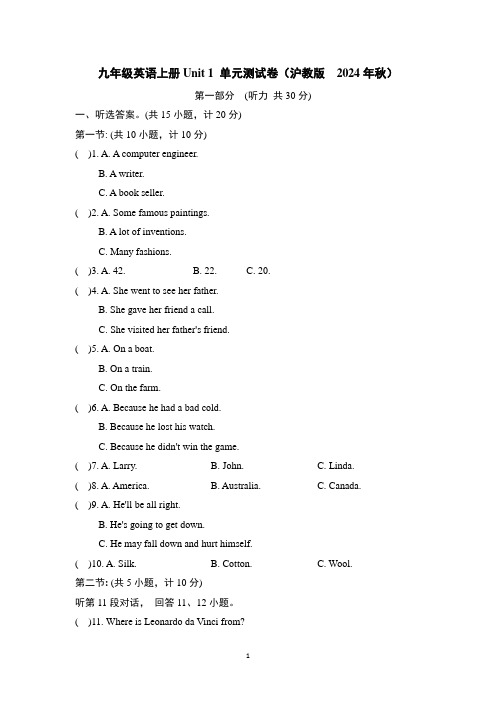
九年级英语上册Unit 1 单元测试卷(沪教版2024年秋)第一部分(听力共30分)一、听选答案。
(共15小题,计20分)第一节: (共10小题,计10分)()1. A. A computer engineer.B. A writer.C. A book seller.()2. A. Some famous paintings.B. A lot of inventions.C. Many fashions.()3. A. 42. B. 22. C. 20.()4. A. She went to see her father.B. She gave her friend a call.C. She visited her father's friend.()5. A. On a boat.B. On a train.C. On the farm.()6. A. Because he had a bad cold.B. Because he lost his watch.C. Because he didn't win the game.()7. A. Larry. B. John. C. Linda.()8. A. America. B. Australia. C. Canada.()9. A. He'll be all right.B. He's going to get down.C. He may fall down and hurt himself.()10. A. Silk. B. Cotton. C. Wool.第二节: (共5小题,计10分)听第11段对话,回答11、12小题。
()11. Where is Leonardo da Vinci from?A. America.B. Germany.C. Italy.()12. When was Leonardo da Vinci born?A. In 1452.B. In 1542.C. In 1453.听第12段对话,回答13~15小题。
【九年级】九年级英语上册Unit1测试题(人教版新目标含答案)

【九年级】九年级英语上册Unit1测试题(人教版新目标含答案)UNIT 1 How do you study for a test?检测题(时间:60分钟;满分:100分)一、部分(满分20分)Ⅰ.听对话,选图片。
每段对话读一遍。
(每小题1分,满分10分)1. What is John looking for?A.B.C.2. How does To learn English?A.B.C.3. When is the boy’s birthday?A.B.C.4. How will ike go to Beijing?A.B.C.5. What is r. Brown’s telephone nuber?A.B.C.6. How will the an go to Beijing Zoo?A. By bike.B. By bus.C. By car.7. Who is going to get soe pictures?A. To.B. r. White.C. rs. Brown.8. What’s wrong with the woan?A. She wants to have a rest.B. She’s tired.C. She’s ill.9. What does the an want to do?A. Clib hills.B. Go fishing.C. Go shopping.10. What does the woan ean?A. r. Black is free.B. r. Black is out.C. r. Black is busy.Ⅱ.根据所听到的内容,选择正确的答语。
每个句子读一遍。
(每小题1分,满分5分)11. A. Good luck.B. It’s great.C. I’ll try it.12. A. It’s nice of you to say so.B. We’d love to.C. Don’t say that.13. A. No, I don’t like.B. Quite well.C. Yes, I’d love to.14. A. Yes, I do.B. Sorry, I won’t.C. No, I don’t.15. A. Congratulations.B. That’s true.C. Have a good tie.Ⅲ.听对话,选择最佳答案。
九年级英语上册 Unit1 单元测试-仁爱版
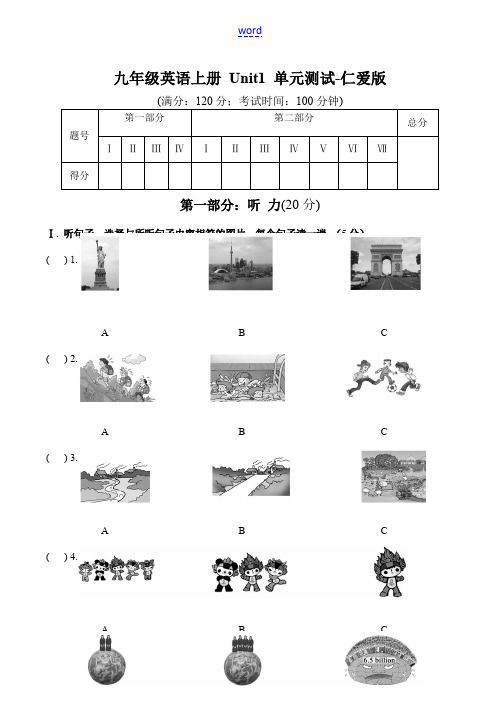
九年级英语上册Unit1 单元测试-仁爱版题号第一部分第二部分总分ⅠⅡⅢⅣⅠⅡⅢⅣⅤⅥⅦ得分第一部分:听力(20分)Ⅰ. 听句子,选择与所听句子内容相符的图片。
每个句子读一遍。
(5分)( ) 1.A B C ( ) 2.A B C ( ) 3.A B C ( ) 4.A B C( ) 5.A B C Ⅱ. 听对话,选择正确答案。
每段对话读两遍。
(5分)( ) 6. A. The U.S.A. B. India. C. Canada.( ) 7. A. No, not yet. B. Yes, he did. C.Yes,he has. ( ) 8. A. Because China’s population grows fast.B. Because China’s education is good.C. Because China’s economy has developed a lot.( ) 9. A. Yes, he think so. B. No, he doesn’t. C. I don’t know. ( ) 10. A. Too much traffic. B. Poor education. C.Population growth. Ⅲ. 听对话,选择正确答案。
每段对话读两遍。
(5分)( ) 11. How many times has Jack visited London before?A. Five times.B. Twice.C. Never before.( ) 12. How many days has Jack been in London?A. One hour.B. Several months.C. Several days.( ) 13. When will Jack have to return?A. In two days.B. In three days.C. In four days.( ) 14. Is this Jack’s fifth visit or sixth visit?A. Fifth.B. Sixth.C. I don’t know.( ) 15. What does Jack think of London?A. He thinks it’s a wonderful place.B. He doesn’t like here.C. He doesn’t think it’s a wonderful place.Ⅳ. 听短文,补全句子。
九年级英语上册Unit1单元检测卷带答案
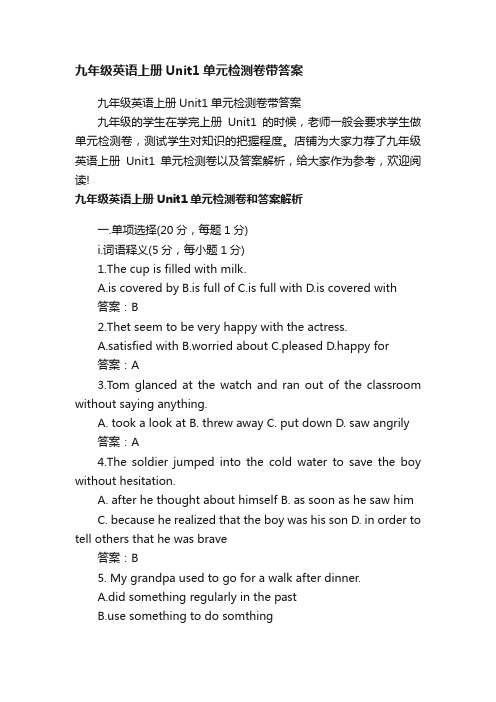
九年级英语上册Unit1单元检测卷带答案九年级英语上册Unit1单元检测卷带答案九年级的学生在学完上册Unit1的时候,老师一般会要求学生做单元检测卷,测试学生对知识的把握程度。
店铺为大家力荐了九年级英语上册Unit1单元检测卷以及答案解析,给大家作为参考,欢迎阅读!九年级英语上册Unit1单元检测卷和答案解析一.单项选择(20分,每题1分)i.词语释义(5分,每小题1分)1.The cup is filled with milk.A.is covered byB.is full ofC.is full withD.is covered with答案:B2.Thet seem to be very happy with the actress.A.satisfied withB.worried aboutC.pleasedD.happy for答案:A3.Tom glanced at the watch and ran out of the classroom without saying anything.A. took a look atB. threw awayC. put downD. saw angrily答案:A4.The soldier jumped into the cold water to save the boy without hesitation.A. after he thought about himselfB. as soon as he saw himC. because he realized that the boy was his sonD. in order to tell others that he was brave答案:B5. My grandpa used to go for a walk after dinner.A.did something regularly in the paste something to do somthingC.have experienced something and it has become a habit答案:Aii.选择填空(15分,每小题1分)6.I _____________ whether his statement is true.A.thinkB.believeC.doubtD.know答案:C7.The hall was ____________ of people.A.fillB.filledC.fullD.fulled答案:C8.We can’t work out the physical problem. Can you tell us____________?A.how to doB.what to do itC.how to do itD.what should to do答案:C9.—The box is too heavy to carry. What’s in it?—Oh, it is ____________books.A.filled withB.covered withed forD.asked for答案:A10.___________ a beautiful car!I’ve never seen it before.A.WhatB.WhichC.HowD.Whether答案:A11.She is from England, ____________she?A.isn’tB.won’tC.hasn’tD.doesn’t答案:A12.—Could I use your bike today?—________________.I’m not using it.A.Sure,go aheadB.I have no ideaC.No,you can’tD.Never mind答案:A13.—What else do you need for your trip?—__________.I’ve packed everything.A.Something elseB.Else everythingC.Nothing elseD.Else nothing答案:C14.—Why don’t you go out to play?—I’m afraid I can’t. I have much homework___________.A.doB.doesC.doingD.to do答案:D15.—Your sweater looks very nice. What’s it made________?—Wool.A.byB.ofC.fromD.in答案:B16.—___________weather it is!—Yes, we can’t go boating on the Xuanwu lake.A.What goodB.How goodC.How badD.What bad答案:D17.Tom had his 15th birthday party last night, ___________?A.didn’t heB.did heC.hadn’t heD.was he答案:A解析:反意疑问句。
九年级上英语Unit1综合测评试卷含答案
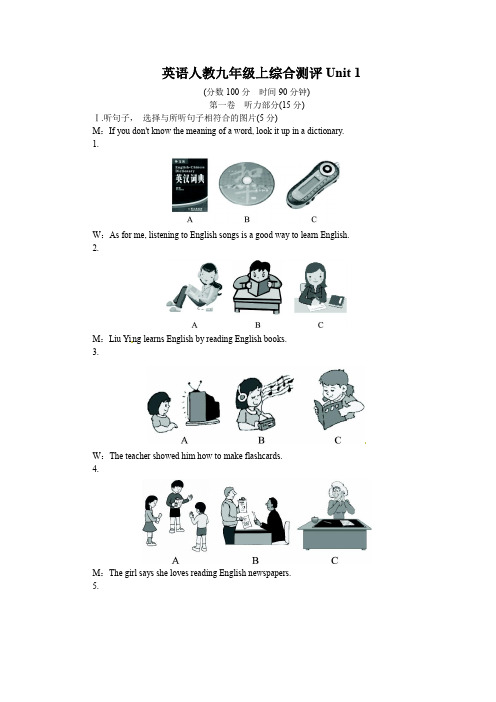
英语人教九年级上综合测评Unit 1(分数100分时间90分钟)第一卷听力部分(15分)Ⅰ.听句子,选择与所听句子相符合的图片(5分)M:If you don't know the meaning of a word, look it up in a dictionary.1.W:As for me, listening to English songs is a good way to learn English. 2.M:Liu Yi ng learns English by reading English books.3.W:The teacher showed him how to make flashcards.4.M:The girl says she loves reading English newspapers.5.Ⅱ.听两段较长对话,选择最佳答案(5分)听第一段对话,回答第6~7题。
W:Do you have any problems when you learn English?M:Yes.I don't know how to improve my writing skills.W:I think keeping a diary every day is a good idea.M:But I often make mistakes in grammar when I write English sentences.W:I have a wonderful grammar book.I can lend it to you.M:Thank you very much.It's very kind of you.6.What kind of skills does the boy want to improve?A.His speaking skills. B.His reading skills. C.His writing skills.7.What does the girl do to help the boy?A.She lends him a dictionary.B.She lends him a grammar book.C.She teaches him how to keep a diary.听第二段对话,回答第8~10题。
- 1、下载文档前请自行甄别文档内容的完整性,平台不提供额外的编辑、内容补充、找答案等附加服务。
- 2、"仅部分预览"的文档,不可在线预览部分如存在完整性等问题,可反馈申请退款(可完整预览的文档不适用该条件!)。
- 3、如文档侵犯您的权益,请联系客服反馈,我们会尽快为您处理(人工客服工作时间:9:00-18:30)。
九年级英语上Unit 1测试(一)学习目标(Language Goal)1. Talk about how to study . 学会讨论各种学习方法和策略。
2. Find out your suitable learning methods. 找出适合自己的学习方法。
(二)语言结构(Language Structures)1. Verb + by with gerund by+动名词短语表示“通过…途径,方法”2. How questions have引导的特殊疑问句(三)目标语言(Target Language)1. How do you study for tests? 你是怎样准备考试的?Well, I study by working with my classmates. 哦,我和同学们一起学习。
2. Have you ever studied with a group? 你曾经参加过学习小组吗?Yes, I have. I’ve learned a lot that way.是的,参加过。
通过这种方式我学了许多。
3. I don’t have a p artner to practice English with.我没有同伴可以练习英语。
Maybe you should join an English club. 或许,你应该参加一个英语俱乐部。
4. What about reading aloud to practice pronunciation?大声朗读来练习发音怎么样?Why don’t you join an English l anguage club?你为什么不参加一个英语俱乐部呢?(四)Key words and phrases (重点词汇)1. flashcard n. 抽认卡2. frustrating a. 令人沮丧的3. memorize v. 记忆,背诵4. aloud adv. 出声地、高声地5. comma n. 逗号6. pronunciation n. 发音7. solution n. 解决办法8. end up 结束,告…终9. not at all 根本(不)全然(不)10. make mistakes 犯错11. later on 以后;随后12. be afraid to 害怕去做13. laugh at sb. 笑话;取笑(某人)14. take notes 做笔记,做记录15. enjoy doing sth. 喜欢做…乐意做…17. make up 组成、构成16. native speaker 说本族语的人(五)重点、难点:(Key points and difficulties)1. by 介词,表示“通过…方法或途径”的意思,译成“靠、通过”by后面可以加名词或动名词短语,eg.(1)The house was destroyed by fire. 房屋被火烧毁了。
(2)travel by air (land , sea)航空(陆路、航海)旅行。
(3)go by train (boat , bus)乘火车(船,公共汽车)去(4)shake sb by the hand 和某人握手(5)I study English by watching English movies. 我通过看英文电影学英语。
另外,by作为介词的含义有很多,我们也已经学习过一些用法,总结如下(1)在…旁边、靠近eg. There is a power station by the river. 河边有一个电厂。
(2)沿着、经由 eg. come by the highway 由公路来(3)由于 eg. by mistake 由于差错(4)被、由 eg. some articles written by Luxun. 一些由鲁迅写的文章(5)(表示面积) eg. a room 5m,by4m 一间长五米宽四米的房间(6)逐批 eg. One by one 一个接一个(7)表示方法、途径如上2. “How”questions How 引导特殊疑问句,有两种含义(1)表示问候: eg. How do you do? How are you? How’s everything going?(2)表示“怎样”eg. How is your new house ? 你的新房子怎么样?It’s great. 它太棒了。
How do you learn English? 你是怎样学英文的?I learn English by reading lots of English magazines.我通过读大量英文杂志学习英文。
请同学们注意how和what引导的疑问句是不一样的,不能混淆。
how通常对程度或方式进行提问,意为“怎么样”,回答通常做状语或表语,what 常对动作的发出者或接受者进行提问,意为“什么”,回答通常做主语或宾语。
试比较:(1)How is your summer holiday ? It is perfect. (表程度,表语)(2)How did you travel around the world ?I traveled by bike. (表方式,状语)(3)What do you learn at school ?I learn Chinese, English, Maths and other subjects.(学习的科目,做宾语)3. 在这一单元中出现的话题是“讨论如何学习”。
这个话题既有趣又实用,既能锻炼我们的口语表达能力,又能使我们学到一些实用的方法,对自身的学习大有帮助。
如何向别人请教学习方法呢?又如何回答呢?请诵读下面的目标句型:How do you study English? (运用特殊疑问句)I study by listening to cassettes. (听录音带)I study by studying with a group. (和小组一起学习)by watching English programs on TV. (看英语电视节目)by enjoying English songs. (听英文歌)by taking part in English classes after school . (上课外英语班)by getting an English tutor. (请英语家教)by reading English magazines and newspaper . (读英文杂志、报纸)by surfing the internet. (网上冲浪)by making flashcards. (制作单词认读卡片)by reading the textbook. (读教科书)by asking the teacher for help. (请教老师)by making vocabulary lists. (列单词表)by taking notes carefully . (认真记笔记)by having the English class carefully . (认真上课)by finishing my homework seriously . (认真完成作业)Do you learn English by …? (用一般疑问句)Yes, I do. / No, I don’t.Have you ever studied with a group? (用完成时态)Yes, I have. I’ve learned a lot that way.What about listening to cassettes? [用what about +动名词提问]I do that sometimes. I think it helps.4. 学会评价各种学习方法的优劣(Comment on the ways of learning English)看到了上面各种各样的学习方法,有些眼花缭乱。
其实,并不是所有的方法都适合自己。
我们要学会判断、评价,然后才能选择最适合自己的.用哪些语言才能表达自己的评价呢?请看下面的目标句型:如:I think studying English by working with a group is a good way because you can ask others when you have questions.I think surfing the internet is a bad way because you have to use a computer and always waste your time.这个句型较长是个复合句,出现了由because 引导的原因状语从句。
进入初三后,我们在写作表达时,要避免再使用仅仅由because 引导的句子,而要写完整的句子。
如:不能写Because I slept late . 意思不完整,不清晰要写成I missed the early bus because I slept late .这样,有原因,有结果,才是完整的句子。
5. 找出自己在英语学习中的困难(Find out your own difficulties in learning English)要选择适合自己的学习方法,还必须清楚自己的困难所在,然后才能有的放矢。
learning English can be difficult . What things are difficult for you ?我们如何来表达自己学习中遇到的困难呢?如何给出建议呢?请诵读下面的目标句型:说出困难:I have a prob lem. I can’t remember the new words.I can’t pronounce some of the words.I can’t understand spoken English.I always make mistakes in grammar.I read very slowly.I don’t know how to speak English well.给出建议:You should read English aloud.Listening can help.Why don’t you join an English language club to practice speaking ? Would you mind remembering new words by flashcards?Please try to talk with your friends in English as much as possible. (请注意不同句式的运用)6. 选择适合自己的学习方法(Choose your suitable learning ways )通过以上各个环节的学习,我们终于可以完成最后的目标:选择适合自己的方法。
